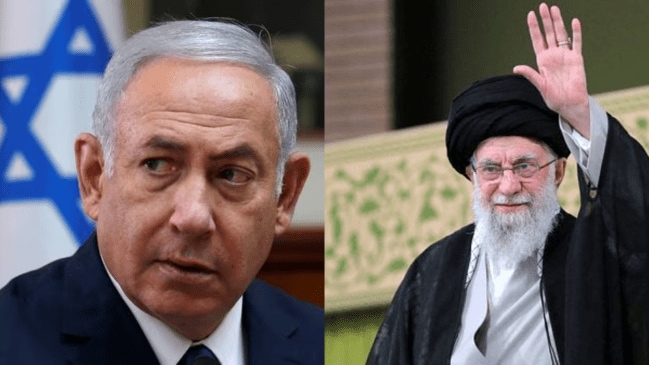Opinion Six takeaways from war-torn West Asia
India’s bilateral relations with Israel have acquired a new chemistry and are at an all-time high but Iran is a partner that cannot be dispensed with either
 Israel Prime Minister Benjamin Netanyahu (Left) and Iran Supreme Leader Ayatollah Ali Khamenei (Right)
Israel Prime Minister Benjamin Netanyahu (Left) and Iran Supreme Leader Ayatollah Ali Khamenei (Right) Across the world, long-festering conflicts are rearing their heads with devastating force. It is no longer taboo to take recourse to the battlefield to defend or promote national security interests. This applies not just to regional or sub-regional actors, but major powers as well. From Russia’s “Special Military Operation” in Ukraine in February 2022 to the United States’ “Operation Midnight Hammer” in Iran a few days ago, the unilateral use of force is challenging international law with impunity.
The attacks launched by Israel and the top-up strike by the US on Iranian nuclear sites have been destabilising and risky. Their reverberations will play out over time, including within Iran. Both the US and Israel have asserted that Iran’s top military and nuclear leadership, along with its nuclear facilities, have been significantly degraded. Some of this has been confirmed by Iran. This would have been unthinkable a few years ago.
There are notable takeaways from recent events.
First, it all began on October 7, 2023. What Hamas started, Israel is finishing now. Iran is the last plucking on Israel’s chess board after Gaza, Lebanon and Syria. The pieces have fallen one by one. This is strategic sanitising on fast forward.
Second, there appear to be two key trends: Iran is degraded and stands pretty much alone in the region; Israel has prevailed militarily, but at the same time, it has lost international public opinion. Both trends are, however, only partially true. Iran’s regime still survives while Israel’s military victory is incomplete and bereft of a political solution. As in the case of the Palestinians, the Islamic world has not gone beyond lip service to support the targeted populations and entities. All Gulf Cooperation Council countries individually condemned Iran’s strikes against the US military base in Qatar. There is silent relief among them over Iran’s nuclear defanging, but uncertainty over its permanence. Russia and China have avoided jumping into the conflict. Western governments have supported the military strikes despite public outrage. The European diplomatic initiative with Iran was too little too late.
Third, the rules-based international order, or whatever is left of it, has been hit with a knockout punch. Unilateralism has triumphed over multilateralism, exceptionalism over universalism, and interests over values.
Fourth, double standards are not a figment of our imagination. There are different standards for different countries. The needs of some countries are more important than others, while some lead a charmed life. If Iran is indicted for pursuing a nuclear weapons programme through deceit and theft, born of sin and cloaked in opacity, and of practicing terrorism as a tool of deterrence, surely there is a far more egregious actor that deserves similar, if not harsher, treatment. It is impossible for a common Indian not to be aghast at the double standards as we contend with Pakistan. Additionally, from India’s point of view, the spectre of the mastermind of the Pahalgam terror attack feasting in the White House a day before the most important US military action in recent memory has been galling. The idea of good and bad terrorists is, of course, an old one.
Fifth, it is just as well that India launched Operation Sindoor. It finally did what others have done to defend national interest. There is similarity in the frustration and impatience in the US and Israeli minds about Iran with that in the Indian mind about Pakistan. If geopolitical rivalries and interests prevent united global action, nations will take recourse to action they deem vital for their security.
Sixth, the name of the game in military affairs today is speed, precision and timing. All-out protracted war with boots on ground is being replaced by use of contactless high technology assets deployed in intelligence-led precision mode for swift action over short periods of time.
The impact of a prolonged crisis in West Asia on India’s interests is evident. We have much to lose. In taking a stand on the crisis, these factors have to be weighed carefully. Consistency of positions is, however, the least important factor. Europe’s silence and acquiescence to US and Israeli actions in Iran and Gaza, while leading the fight and moral outrage against Russia’s military operations, in Ukraine is a ready example.
India is not the only country that has to balance its ties with Iran, the Gulf states and with Israel. There are overlapping sensitivities and crossed wires across the Gulf, the Arabian Peninsula and the Levant. The Indian approach to this complexity mirrors the approach of the countries of the region themselves. Targeted country-specific policies, rather than a utopian pan-West Asian or pan-Arab policy are what has made India’s outreach in the region successful.
India’s bilateral relations with Israel have acquired a new chemistry and are at an all-time high. The two are united in their fight against terrorism. There is a history of them helping each other when it matters most. India can relate to the threats Israel faces from a nuclear or terror network. At the same time, India has made major inroads in the Gulf with Saudi Arabia and the UAE, and other Arab states.
most read
Iran is a partner that cannot be dispensed with. There are good reasons why the India-Iran relationship has survived all odds. Apart from the civilisational linkage and Iran’s geographical location, the Pakistan factor impacts the India-Iran relationship. There is more goodwill for India in Iran than there is for Pakistan. Iran is a key counter-balance to Pakistan. It was just last year that Iran conducted its own version of Operation Sindoor against Jaish-e-Adl terror camps in Pakistan. India’s call for dialogue, diplomacy and de-escalation are intended to give relief to Iran.
West Asia is a region that has lurched from one crisis to another. It is home to multiple conflicts. Today, it is experiencing its most profound moment of political reengineering and strategic reordering. The question is, where will Iran go from here? Has it reached a tipping point internally? What will it take for it to be allowed to rejoin the international mainstream?
The writer is Convenor, NatStrat, and Former Deputy National Security Adviser and Ambassador






